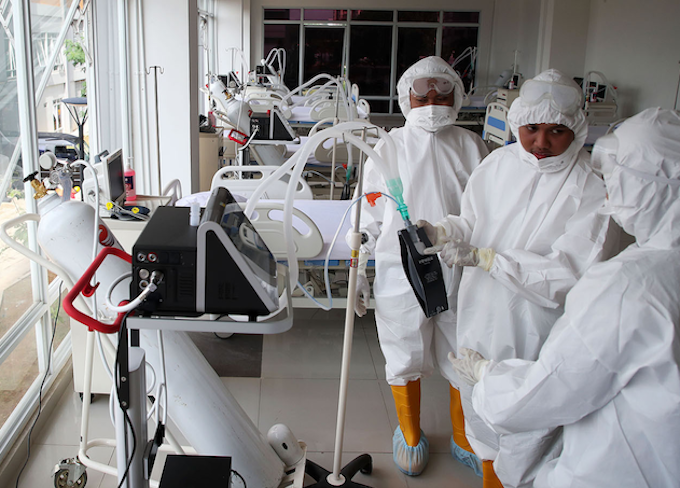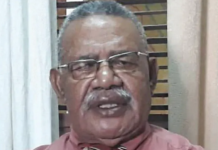
By Ardila Syakriah in Jakarta
Experts are warning the public in Indonesia against panic-buying chloroquine phosphate, an antimalarial drug thought to be a possible treatment for Covid-19, citing the dangerous side effects of the medicine.
Reports have surfaced that people had started to purchase the drug without doctors’ prescription after President Joko “Jokowi” Widodo announced last Friday that the government was preparing medicines, including three million doses of chloroquine, which he described as “having been proven to cure Covid-19 in other countries”.
The West Papua region, where malaria remains a problem, has recorded three confirmed Covid-19 cases as of Wednesday, as nationwide cases have reached 893 with 78 deaths.
READ MORE: Indonesia starts rapid tests, imports medicines to ‘cure’ Covid-19, Jokowi says
Maksum Radji, a clinical microbiologist at the University of Indonesia’s (UI) School of Pharmacy, said the government must be careful in distributing information about the drug as clinical trials were still underway to measure its effectiveness in treating COVID-19.
Even then, any consumption of the drug must be done under a doctor’s supervision, he said.
“It’s wrong to purchase and consume the drug to prevent catching the virus that causes Covid-19. Chloroquine is a strong drug […] given its side effects,” Maksum told The Jakarta Post on Tuesday.
He listed the common side effects of chloroquine consumption, including nausea, vomiting, diarrhea, breathing difficulties, blurred eyesight, stomach cramps, swollen ankles, tinnitus, weakened muscles and mental disorders.
Cautious about chloroquine
Nafrialdi from the Clinical Research Support Unit at the UI’s School of Medicine said that even doctors would be very cautious when prescribing chloroquine, which would only be used on severe cases, as the side effects could lead to burst blood vessels and heart attacks in extreme instances.
Chloroquine is used as a second-line drug, the experts say, meaning that it would only be used when initial medicines, common ones used to treat Covid-19 patients’ clinical symptoms, such as fever, do not produce any satisfying results.
Even then, experts are still split over its use in treating the disease.
There are currently no vaccines or antiviral drugs approved for the disease but the World Health Organisation (WHO) is launching a multinational trial to search for potential treatments for the virus, which include chloroquine.
Other drugs in its trial are the experimental antiviral remdesivir initially developed to treat the Ebola virus, an HIV drug combination consisting of the lopinavir/ritonavir and the lopinavir/ritonavir plus interferon.
Maksum of UI said that chloroquine was still used in Indonesia, although not as commonly as other antimalarial drugs considering its side effects.
The drug is being sold on e-commerce platforms in Indonesia.
Difficult to obtain in Papua
In Papua, chloroquine used to be easy to find and purchase, a resident who refused to be named told the Post. Recently the drug had got more difficult to obtain, she added, attributing its scarcity to the drug being named a possible treatment for Covid-19.
When reports said that the drug could be used to treat Covid-19 patients, the 55-year-old woman said she consumed the drug every day until she learned about its side effects and that its effectiveness was still being studied.
“No one wants to be infected by the virus,” she said.
The woman said that the government had not been distributing essential information for residents in her area to prevent the spread of the virus, prompting her to relay information about the new virus strain that she learned from the media to her neighbors.
Jokowi said on Monday that the millions of chloroquine doses were produced in the country by state-owned pharmaceutical company PT Kimia Farma and would only be used on Covid-19 patients if doctors deemed it necessary. The company was not available for immediate comment.
“Chloroquine is not a first-line treatment, but a second-line treatment […] The drug is not an over-the-counter drug, so the consumption must be on doctor’s orders,” Jokowi said, adding to his earlier statements about the drug, which many consider misleading.
The government’s spokesperson for Covid-19 affairs, Achmad Yurianto, has also warned the public that chloroquine was not for prevention purposes and hence must not be consumed at home.
“We ask people, once again, not to purchase, store and consume the drug without a doctor’s prescription,” Yurianto said.
WHO-led clinical trials
If Indonesia was to use the drug on its Covid-19 patients, Maksum of UI said the government should participate in the WHO-led clinical trials to study potential Covid-19 treatments so that the results could be part of the WHO’s global data.
He cited experts suggesting that chloroquine could disrupt the virus’ ability to infiltrate living cells and replicate itself, although emphasizing the need for further studies to prove these early assumptions.
Drug discovery commonly would take years and involve at least three stages, but in cases like Covid-19 that had been declared a global pandemic, conforming to such lengthy steps was impossible, Maksum said.
Experts globally have cautioned people not to resort to self-medication since a man in the US state of Arizona died after he ingested chloroquine phosphate — an aquarium cleaning product similar to the drug that had also been named by US President Donald Trump as a potential treatment for Covid-19, Reuters reported.
Trump tweeted about the combination of hydroxychloroquine and azithromycin, saying it had “a real chance to be one of the biggest game changers in the history of medicine” – a claim played down by America’s top infectious disease expert, Dr Anthony Fauci, who said that the therapy must be tested to assure its safety and efficacy.
Ardila Syakriah is a reporter with The Jakarta Post and this article was first published by the Post.












































